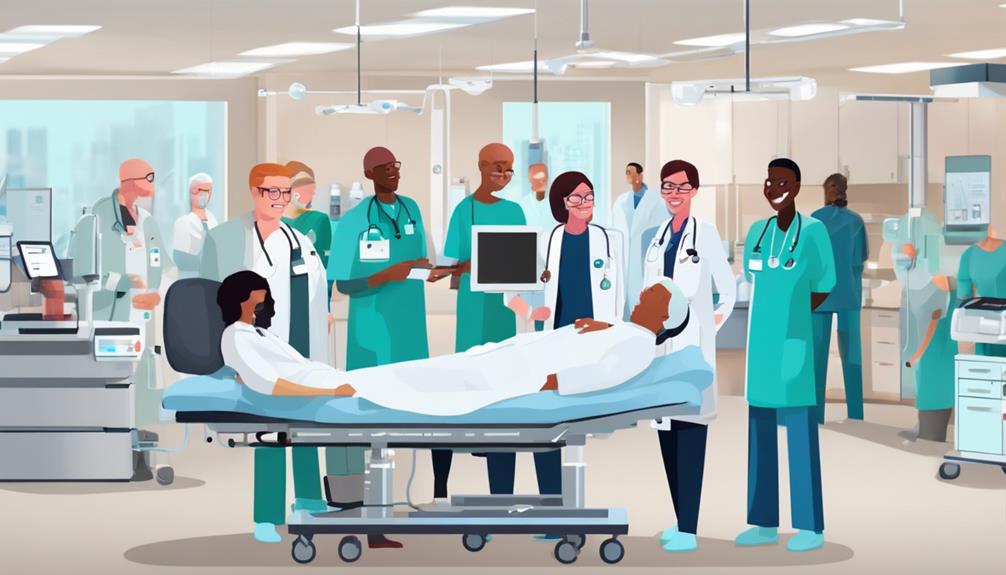When it comes to 'Takeaway Cancer,' you may be surprised by the simple yet impactful steps you can take to enhance your well-being and potentially reduce your cancer risk. By exploring key risk factors, understanding the significance of early detection, and embracing personalized treatment options, you can equip yourself with knowledge that may shape your health journey. Stay tuned to uncover practical strategies that empower you to navigate the complexities of cancer care and make informed decisions that prioritize your overall wellness.
Understanding Cancer Risk Factors

To reduce your risk of cancer, start by understanding the key risk factors. Genetic predisposition and environmental exposure play significant roles in cancer development. Some individuals may have inherited genetic mutations that make them more susceptible to certain types of cancer. Additionally, exposure to environmental factors such as UV radiation, tobacco smoke, and air pollution can increase your risk.
Furthermore, lifestyle choices also greatly impact your chances of developing cancer. Factors like smoking, excessive alcohol consumption, poor diet, and lack of physical activity can all contribute to an increased risk of various cancers. Making healthier choices, such as quitting smoking, moderating alcohol intake, eating a balanced diet rich in fruits and vegetables, and exercising regularly, can help lower your risk.
Incorporating preventive measures into your daily routine is essential. Regular screenings and check-ups can aid in early detection and treatment. Additionally, practicing sun safety, avoiding harmful chemicals, and maintaining a healthy weight are all proactive steps you can take to reduce your risk of cancer.
Importance of Early Detection
Understanding cancer risk factors sets the foundation for recognizing the importance of early detection in improving treatment outcomes. By being aware of your risk factors, you can take proactive steps towards early detection, which is essential for better survival rates.
Regular screenings play a key role in detecting cancer in its early stages when it's most treatable. These screenings offer numerous benefits, including the ability to identify cancer before symptoms appear, leading to more effective treatment options.
Awareness campaigns and community support are essential in promoting the significance of early detection. These initiatives help educate individuals about the importance of routine screenings and empower them to take charge of their health.
The more people are informed about the benefits of early detection, the more likely they're to prioritize screenings and catch cancer at an early, more manageable stage.
Personalized Treatment Approaches

Recognizing your unique medical history and genetic makeup allows for tailoring cancer treatment to your specific needs and characteristics. Genetic testing plays an essential role in identifying specific genetic mutations that drive cancer growth. By understanding these genetic alterations, doctors can prescribe targeted therapy, which focuses on blocking the specific molecules involved in the growth and spread of cancer cells.
Precision medicine, a key component of personalized treatment, involves customizing therapies based on individual characteristics such as genetics, lifestyle, and environment. This approach aims to optimize treatment effectiveness while minimizing side effects.
Immunotherapy is another personalized treatment approach that harnesses the power of the immune system to fight cancer cells. By boosting the body's natural defenses, immunotherapy helps target and destroy cancer cells more effectively.
Role of Nutrition and Exercise
Exploring the impact of nutrition and exercise on cancer treatment outcomes reveals important insights into improving overall health and well-being.
Dietary habits play a significant role in cancer prevention and management. Consuming a balanced diet rich in fruits, vegetables, whole grains, and lean proteins can provide essential nutrients that support the immune system and help the body fight off cancer cells. On the other hand, a diet high in processed foods, saturated fats, and sugars may contribute to inflammation and oxidative stress, potentially exacerbating cancer progression.
Incorporating regular physical activity into your routine is equally significant. Engaging in physical activity not only helps maintain a healthy weight but also reduces the risk of developing certain types of cancer. Exercise can also improve energy levels, boost mood, and enhance overall quality of life during cancer treatment.
Whether it's going for a brisk walk, practicing yoga, or hitting the gym, finding activities that you enjoy and can sustain is key to reaping the benefits of physical activity in your cancer journey. By prioritizing healthy dietary habits and physical activity, you can positively impact your well-being and treatment outcomes.
Mind-Body Connection in Healing

To fully optimize your cancer treatment outcomes, it's important to acknowledge the profound impact of the mind-body connection in the healing process. Cultivating a positive mindset plays a vital role in your healing journey. Research shows that maintaining a hopeful and optimistic outlook can have substantial benefits on your overall well-being during cancer treatment.
Engaging in practices such as meditation therapy can greatly aid in stress reduction. Meditation allows you to center your thoughts, manage anxiety, and enhance your emotional resilience. By incorporating this practice into your routine, you can create a sense of calm amidst the storm of cancer treatment.
Empowering Patients in Decision-Making
Empower yourself by actively participating in the decision-making process regarding your cancer treatment. Patient empowerment is vital in maneuvering through the complexities of cancer care. When faced with different treatment options, it's important to gather information, ask questions, and voice your concerns to make informed decisions.
Your healthcare team is there to guide you, but your input is invaluable in shaping your treatment plan. Take the time to research various treatment modalities and understand their potential benefits and side effects. Discuss your preferences and goals with your medical team to tailor a treatment plan that aligns with your values and priorities.
Conclusion
Take control of your health by understanding your cancer risk factors. Prioritize early detection and explore personalized treatment options. Maintain a healthy lifestyle and recognize the mind-body connection in your healing journey.
By empowering yourself with knowledge and taking proactive steps towards your well-being, you can navigate the challenges of cancer with confidence and resilience. Remember, you have the power to make informed decisions and optimize your overall health throughout your cancer experience.
Stay strong and stay informed.




